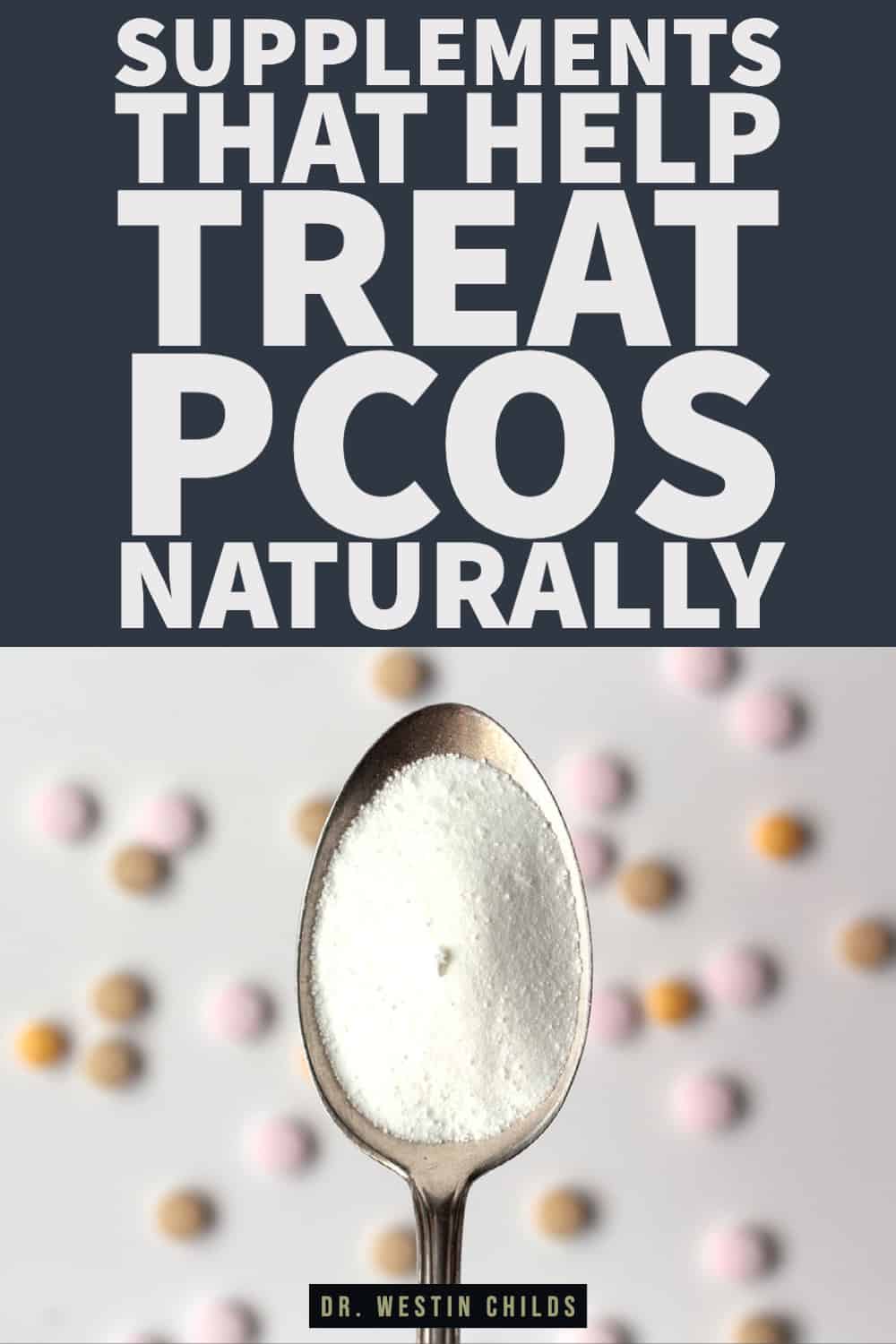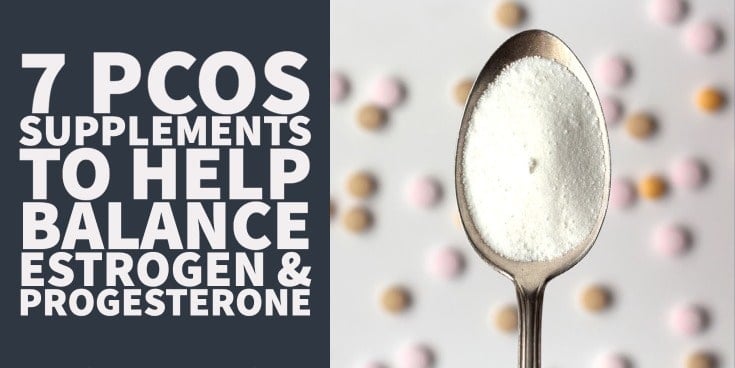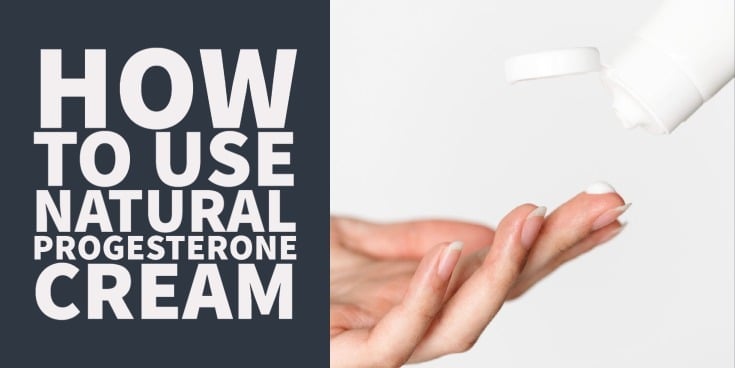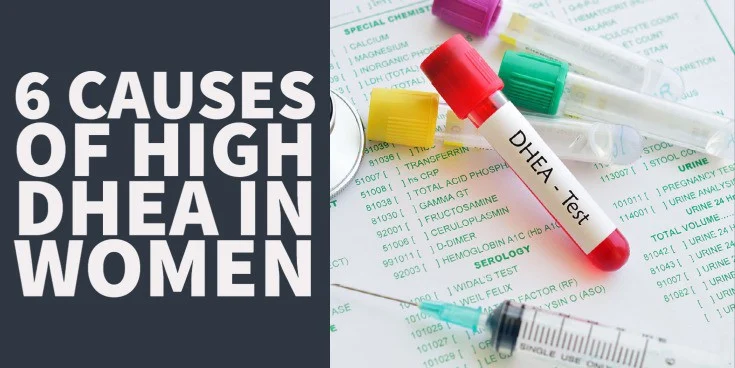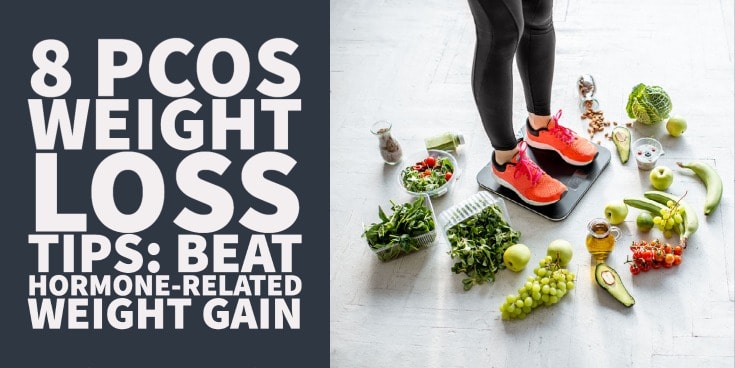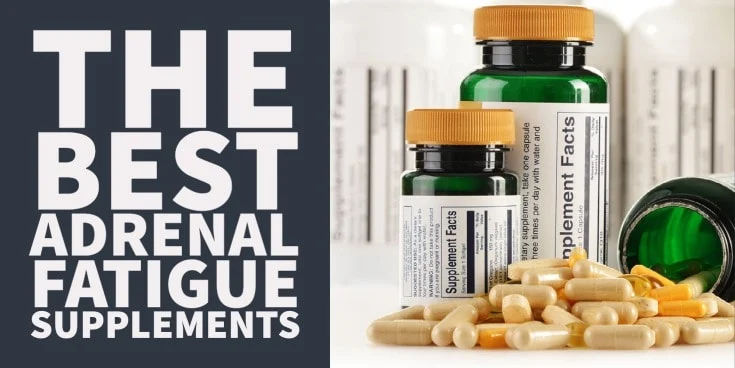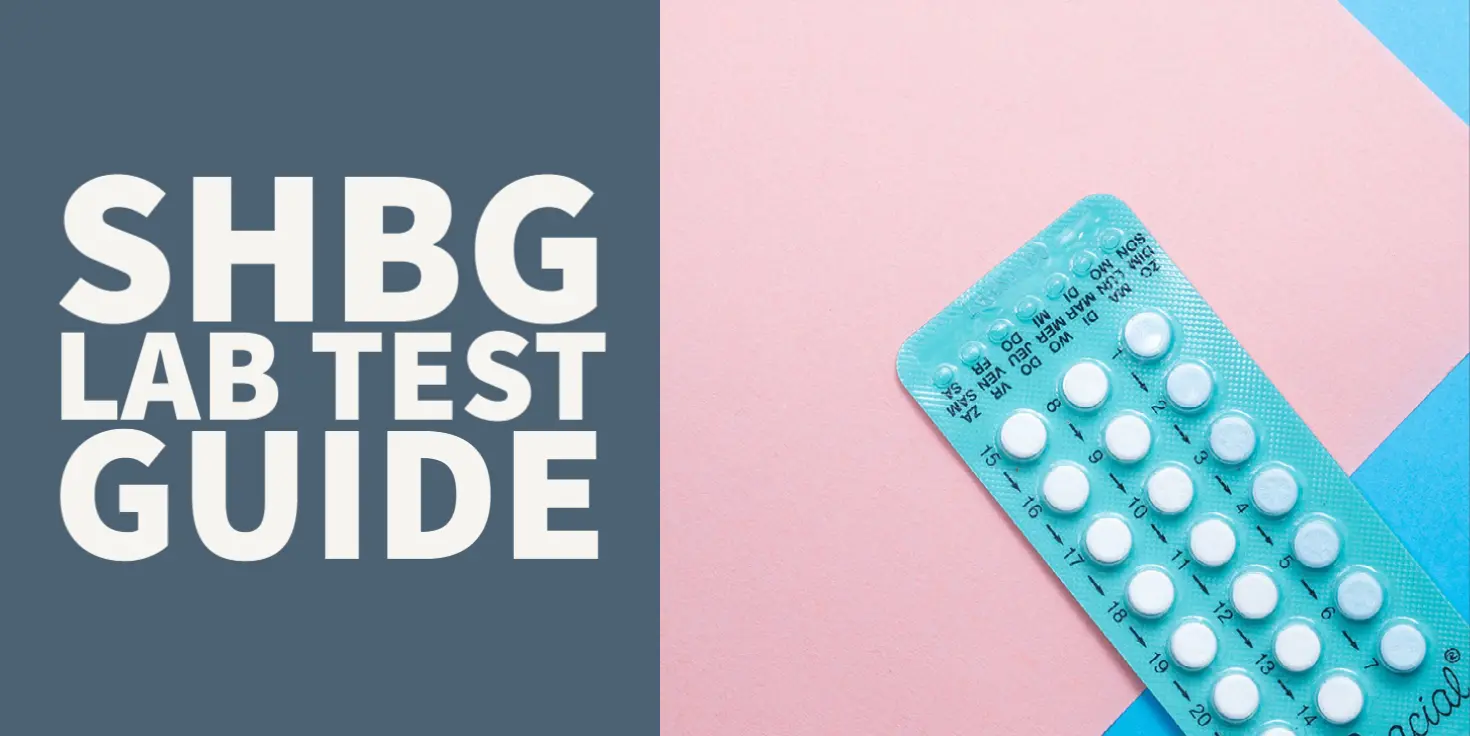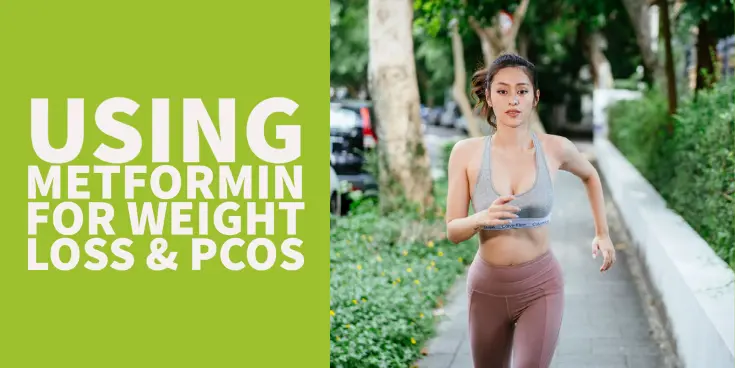Why is PCOS so hard to treat?
One of the main reasons is that we tend to treat only the symptoms of PCOS and not the CAUSE.
This philosophy extends to supplements as well:
In order to treat your PCOS using supplements, you will need to target those supplements to your body and YOUR hormone imbalances for the best results.
Learn how to properly use PCOS supplements to help balance your hormones, lose weight, increase your energy, reduce hair loss, and get rid of the unwanted symptoms associated with PCOS:
Do Supplements Really Help PCOS?
YES.
Targeted supplements can actually help treat many of the problems associated with PCOS.
The tricky part is targeting your supplements to YOUR body (more on that later).
In order to determine which supplements actually have benefits, we need to go back to the basics.
What is PCOS?
It has lots of definitions, but in the most simple sense, PCOS is the combination of a number of hormone imbalances in the body that lead to certain specific signs and symptoms.
Which hormone imbalances am I talking about?
Most patients with PCOS have some degree of the following hormone imbalances:
- Insulin resistance or high blood sugar
- High testosterone or high androgens
- Low progesterone or relatively high estrogen levels (this may come as high estrogen metabolites)
- Usually some degree of leptin resistance and hypothyroidism (this is usually secondary, but still present)
Obviously, we can’t put all women with PCOS into this box, but the vast majority of women with PCOS will experience 1 or more of the hormone imbalances listed above.
So really, it’s helpful to think of PCOS as a condition on a spectrum.
The worse your symptoms, the more hormone imbalances you have.
The more hormone imbalances you have, the more supplements/hormones, etc. you will need to treat the problem.
It is THESE hormone imbalances that lead to the majority of the symptoms that PCOS patients experience.
Symptoms like:
- Weight gain, despite eating clean/healthy and cutting your calories (this stems from a combination of insulin resistance, hypothyroidism, and leptin resistance (1))
- Menstrual irregularities, cramping with your cycle, heavy menstrual flow, etc. (Caused by imbalances to the progesterone/estrogen ratio (2))
- Symptoms of estrogen excess like fibrocystic breast disease, endometriosis, PMS/PMDD, etc. (Caused by high estrogen levels and low progesterone (3))
- Depression and changes in mood and/or well-being (Caused by hypothyroidism and changes to sex hormones like estrogen/progesterone (4))
- Hair loss (Caused by hypothyroidism, nutrient deficiencies, and excess testosterone/androgens)
- Excess hair growth (Caused by excess Testosterone and insulin resistance)
- Infertility (Caused by a combination of hypothyroidism (5) and low progesterone)
You can see that virtually all of the primary symptoms of PCOS can be explained by the hormone imbalances present in the body.
This is both a good and a bad thing:
Bad in the sense that these symptoms can be difficult to deal with, but good in the sense that we can target your supplements and treatment!
- Bottom line: Target your supplements to the hormone imbalances that CAUSE the symptoms of PCOS. This is the best way to get symptomatic relief and treat the underlying cause.
Targeting your Supplements
The next step to getting on the right supplements is making sure that the supplements you choose target the hormone imbalances that we discussed above.
Believe it or not, there are studies that show how certain supplements can improve these hormone imbalances.
In the next section, I will walk you through how to pick those supplements, how they help, and what doses are necessary for optimal results.
When picking your supplements it’s important to realize that not all supplements are created equal.
Because the supplement industry isn’t regulated like the pharmaceutical industry some brands can slap low-quality ingredients in their products and call it a day.
These types of products will NOT result in the improvement in your symptoms that you are looking for.
The Best PCOS Supplements
In order to get the best results, it’s best to target these supplements to YOUR body.
Whenever possible I will mention which hormone abnormalities the supplements will tend to treat.
For instance:
The first several supplements target the more common abnormalities in PCOS women like estrogen dominance and high androgen levels.
Please take this into account when you determine which supplements would be best for you.
Let’s get started:
#1. DIM + Indole-3-Carbinol
First up are DIM and Indole-3-carbinol.
Don’t let the names scare you, they are actually quite helpful for patients with PCOS.
How do they work and what do they target?
Well, we already know that women with PCOS tend to have high levels of circulating estrogen in their bodies.
What you might not realize is that there are two important factors when looking at estrogen levels:
#1. Production of estrogen in the body, and the ratio of progesterone to estrogen.
#2. The elimination of estrogen by your liver and the production of estrogen metabolites.
Most of the focus is put on the production of estrogen in your body.
But by focusing on the production you leave out a very important part: increasing the speed at which your body gets RID of estrogen.
It turns out that in order to get eliminated from the body, estrogen needs to be “cut” into smaller pieces by your liver.
This elimination process results in estrogen by-products that are still somewhat active in your cells!
So if your body has a hard time metabolizing out these particles then you may have excess estrogen metabolites floating around triggering your estrogen receptors.
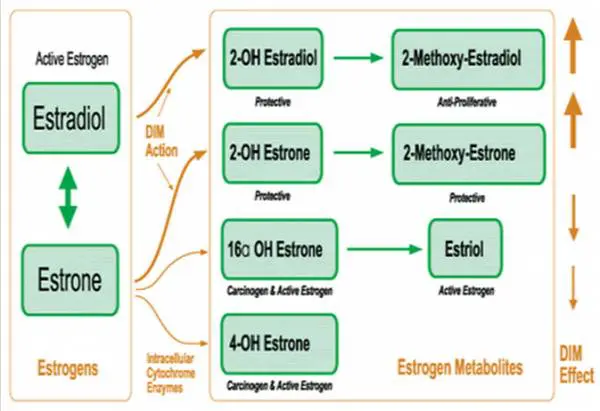
So when we talk about eliminating estrogen we need to do it more quickly AND we want to produce estrogen metabolites that are less metabolically active.
This is where DIM and indole 3 carbinol step in.
These supplements help promote estrogen metabolism (6) in your body and they help to produce less active estrogen metabolites.
Taking DIM helps increase the production of 2-hydroxy estrone which is actually felt to have some protective capacity when it comes to breast cancer (7).
#2. Calcium D Glucarate
Next up is a very important substance known as Calcium D glucarate.
This is a substance found in fruits and vegetables (found naturally as glucaric acid).
I should point out here that it’s a great idea to make sure you clean up your diet if you have PCOS! As you might have noticed many of these supplements are found naturally in fruits and vegetables.
Back to Calcium D glucarate:
Why is it so helpful for women with PCOS?
It turns out that this substance has a special impact on phase II metabolism in your liver.

The phase II elimination pathway in your liver helps your body get rid of 2 very important things that are important for PCOS patients:
First: Estrogen metabolites (as we discussed above). And…
Second: Endocrine-disrupting chemicals and xenoestrogens.
You already know why getting rid of excess estrogen is important (we discussed it above in regard to DIM) so we will focus on xenoestrogens and endocrine-disrupting chemicals.
People nowadays are exposed to certain chemicals on a DAILY basis that can actually mimic estrogen hormones in your body.
These compounds are known as xenoestrogen (meaning foreign estrogen-like molecules) and they can sit on top of estrogen receptors in your body and make your body think that it has more estrogen than it really does.
You may think this is rare, but it’s actually not.
Recently the Endocrine society put out a paper (8) discussing how endocrine-disrupting chemicals are ubiquitous (meaning ALL over the place) and that they can seriously impact your hormonal function.
What’s more interesting is that we don’t have a great way to test for these compounds AND they interfere with our ability to interpret and understand hormone lab tests.
For instance:
Certain endocrine disruptors can reduce circulating T3 thyroid levels WITHOUT altering your TSH levels.
This combination results in hypothyroid-like symptoms but normal thyroid labs.
The same kind of problem can also occur in patients with PCOS and may explain why some women have very obvious lab abnormalities while other patients do not.
So how does Calcium D glucarate fit into this?
Well, it turns out that Calcium D glucarate helps your body ELIMINATE these xenoestrogens, endocrine-disrupting chemicals, and estrogen metabolites by increasing liver metabolism and excretion (9).
The only downside to using Calcium d glucarate is that it provides a temporary boost to elimination which means you will need to keep taking the supplement for best results.
But this can help quickly eliminate any excess endocrine-disrupting chemicals you may come into contact with.
#3. Zinc + Saw Palmetto
Next up is a combination of supplements that will help your body get rid of excess androgens.
We’ve discussed how to eliminate estrogen and estrogen metabolites, but we haven’t discussed how to reduce testosterone levels.
As you probably know one of the more concerning side effects (from a cosmetic point of view) is the excess hair growth, and sometimes hair loss, that can occur in PCOS.
These symptoms stem from having TOO much testosterone (or other androgens) in the body.
While women do have a need for testosterone, you do NOT want to have excess.
So how do you know if you have too much testosterone?
Well, you can certainly check both your free and total testosterone levels through lab testing, but sometimes these labs can come back as high normal which may prompt physicians to ignore them.

(Most women with PCOS tend to have normal total testosterone levels but high FREE testosterone levels or high normal – the lab tests above indicate a fairly normal pattern for PCOS patients)
Instead of focusing on just labs, it’s helpful to focus on a combination of labs plus symptoms.
List of symptoms associated with high testosterone and high androgen levels:
- Excess hair growth on the chin, face, and upper lip
- Male patterned hair loss or hair loss in general
- Acne, especially on the chin/face/back area
- Mood disturbances like depression, anxiety, or general moodiness
- Weight gain
The combination of symptoms plus high serum levels of testosterone can help identify if you are having issues with androgen.
And that’s where Zinc and saw palmetto step in:
Both of these supplements help your body ELIMINATE (get rid of) testosterone in a way that doesn’t activate testosterone receptors.
Much like estrogen, testosterone needs to be eliminated in your body and part of that process is a conversion process.
Your body has the ability to turn testosterone into a more potent androgen known as Dihydroxy testosterone or less potent androgen metabolites.
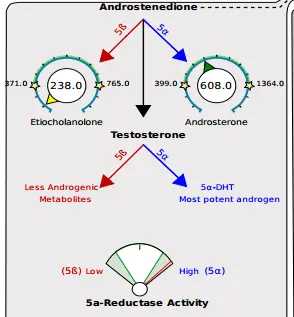
Zinc and saw palmetto help reduce the enzyme that promotes conversion to the more potent androgen (this is a good thing).
Another added benefit is that taking zinc may also promote T4 to T3 conversion if you have thyroid problems.
This combination of supplements should be taken together for the best benefit and should be seriously considered if you have ANY of the symptoms of excess testosterone listed above.
#4. Berberine + Alpha Lipoic Acid + Chromium
This set of supplements should probably be #1 in terms of importance.
Why?
Because I believe that the majority of the problems associated with PCOS stem from 1 hormone imbalance:
Insulin resistance (10).
Insulin resistance leads to increased testosterone levels, leads to weight gain, and changes in sex hormones like progesterone and estrogen levels.
Because of these changes insulin resistance has been implicated as one of the primary causes of PCOS.
This is also why many of the treatments for PCOS target insulin resistance.
Because insulin resistance is so important in treating PCOS it’s usually best if you use a combination of hormones plus supplements plus lifestyle changes to treat the condition.
This is where most providers and patients get it wrong:
They treat insulin resistance with something like metformin or a single supplement like chromium.
While these therapies may be somewhat helpful you really need to layer multiple therapies in order to have the BEST effect.
That’s why this section contains 3 supplements that all help to reduce insulin resistance.
Why?
Because the combined effect of these supplements is far superior to using just one.
Because we are talking about supplements I won’t go into detail on using medications, but you should know that in order to have the most benefit you should be using these supplements in addition to any medications to target insulin resistance.
So how do these supplements work?
They work by targeting your cells and increasing insulin sensitivity (11).
Basically, they make the existing insulin work better in your body which helps to reduce insulin levels overall.
Berberine, for example, has also been shown to be as effective as metformin (12) at reducing blood sugar levels, and each of these supplements has been shown to help with weight loss to some degree.
These supplements should also be combined with a very healthy whole-food diet for the best results.
Another very important aspect of using these supplements is the dose.
Most of the supplements require very high doses to be effective (I will go over those below), so if you’ve used them in the past but at lower doses and without combination therapy then that may explain why you didn’t get your desired results.
#5. Fish Oil
Next up on the list is fish oil.
You probably already know that fish oil is healthy, but you may not realize why.
Fish oil is another one of those supplements that most people take at some point in their life, but they may not be taking a high-quality fish oil supplement at a high enough dose.
So why is fish oil helpful for PCOS patients?
Primarily because it does 3 very important things:
- Reduces insulin resistance (and has been shown to help with weight loss)
- Reduces leptin levels (which again helps with weight loss)
- Reduces systemic inflammation which improves all hormonal systems
I’ve written extensively on how fish oil can help with weight loss and reduce blood sugar levels which you can read about by clicking here.
Since we’ve already discussed the importance of insulin resistance, I want to focus on leptin levels (which are more difficult to treat).
Leptin is a hormone secreted by your fat cells that is supposed to send a signal to your brain to burn more calories to help with weight loss.
If you are overweight and have PCOS, chances are high that you have a condition known as leptin resistance.
If you have leptin resistance your body thinks you’re in a state of starvation which increases your appetite and lowers your metabolism – basically it makes weight loss impossible.
Leptin resistance is one of the primary reasons that women with PCOS have difficulty with weight loss (among other reasons), and it’s something that doesn’t get a lot of attention.
This is where fish oil steps in:
Fish oil has actually been shown to help reduce leptin levels (13) and reverse leptin resistance – this, in conjunction with its effects on insulin resistance, is why fish oil can directly help with weight loss.
You can learn all of the ins and outs of fish oil supplementation in the article above, but for now, just realize that you can really boost the effects of fish oil on leptin resistance by adding in the right type of exercise.
If you do decide to use fish oil make sure that you combine it with a healthy lifestyle (exercise + whole food diet) for best results, also make sure you use a high enough dose (it’s higher than you probably realize).
#6. Adrenal Support
Next up is a more controversial topic and that is adrenal function.
We can argue and discuss the connection between cortisol and adrenal fatigue, but at the end of the day what’s more important is helping you INCREASE your energy levels.
One of the main symptoms of PCOS is fatigue.
While it’s true that the fatigue experienced in PCOS patients is likely multi-factorial (meaning several things are probably causing it) one thing is for sure:
Taking an adrenal supplement has the potential to dramatically improve your energy levels.
Why is that?
Well, nowadays it’s not uncommon for women (and men) to be exposed to extreme levels of stress.
This low-grade chronic stress can really impact your hormones and energy levels.
In addition, stress has a DIRECT effect on hormone imbalances like insulin and thyroid function (14).
This gives us an opportunity to treat this problem with certain adrenal adaptogens.
The adaptogen Ashwagandha has been shown to do several very important things in patients (all relevant studies are in the links to the claims made):
- Reduce androgens (15)
- Treat depression and anxiety (16)
- Help with weight loss and increase metabolism (17)
- Increase muscle mass (18)
- Increase energy levels (19)
- Increase thyroid function (20)
- Increase the quality of your sleep (21)
- Help your body tolerate stress (22)
- Increase your sex drive (23)
That’s a pretty exhaustive list of benefits that can all come from Ashwagandha and it isn’t even complete.
As you go through the list and read the studies that I’ve provided I think you will find that ALL of these hormones are somehow connected in your body.
How else can you explain that Ashwagandha helps with ALL of the conditions, ranging from sleep issues to weight loss and metabolism?
The bottom line:
If you are suffering from fatigue in some way or any of the symptoms listed above, you should seriously consider using Ashwagandha in appropriate doses.
#7. Bio-identical Progesterone
Lastly, it’s worth mentioning the supplement (or hormone rather) progesterone.
Unlike other hormones in the US, progesterone can be purchased over the counter.
But just because it can be purchased over the counter doesn’t necessarily mean that it should be.
Just in terms of raw numbers, the female body has more progesterone than it does estrogen.
So if that is any measure of importance, then progesterone might be more defining to female sexual characteristics than estrogen (but we will save that for another time).
What’s more important than that is the question:
Should you consider using progesterone?
That’s an interesting question and worth exploring.
Before we discuss whether or not you should use it, we need to talk about progesterone facts.
First:
Over time all women will eventually have low progesterone.
This decrease in progesterone starts around age 35 when progesterone levels tend to fall more rapidly than estrogen levels.

So starting from age 35 progesterone levels fall until women reach menopause at which point progesterone levels tend to fall to zero.
While estrogen levels fall to almost zero, estrogen levels may actually stay high.
And this primarily happens due to estrogen conversion in peripheral fat cells.
Second:
Women with PCOS tend to have low progesterone levels at baseline and higher estrogen levels at baseline.
This starting combination can exacerbate progesterone deficiency as women age and may lead to worsening symptoms long term.
But just because this happens does it mean you should use progesterone?
It’s true that progesterone can literally be life-changing for some women, but it can also be detrimental for others (leading to hormone problems and weight gain).
My recommendation is to check your progesterone level AND check to see if you have any of the following progesterone deficiency symptoms prior to supplementing.
Symptoms of progesterone deficiency:
- Sleep disturbance
- Water retention
- Irregular periods (if menstruating)
- Anxiety or difficulty relaxing
- Emotional and other mood problems
- Decreased libido
- Hot flashes
- Breast tenderness and pain
- Breast lumps or cysts
- PMS, fibroids, & endometriosis
If you find that you have a combination of these symptoms plus low progesterone levels on serum testing then it would be worth a trial of progesterone therapy.
Just make sure to monitor your symptoms as you use it and discontinue the use of progesterone if you experience negative side effects.
Back to you
I hope you found my recommended list of PCOS supplements helpful.
Just remember that these supplements only represent ONE part of a complete treatment regimen for patients with PCOS.
You can’t forget lifestyle changes like diet and exercise.
Also, if you decide to use any of these supplements, make sure that you use the recommended brands and the recommended dosages for the best results.
For most of these supplements, you will need to use them for at least 3 months to experience optimal results.
Now it’s your turn:
Are you using supplements to treat your PCOS?
Which ones have worked?
Which haven’t?
Leave your questions or comments below!
